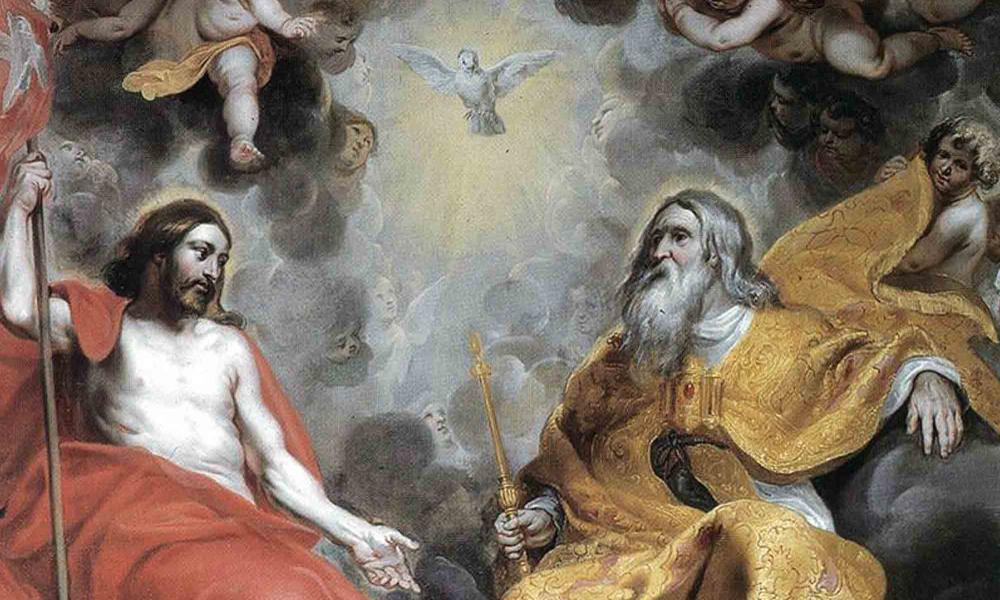
I really don't understand the Trinity
Dear Father Joe: Recently, at Mass, the priest told us it was Trinity Sunday and talked about how important the Trinity is. But honestly, I still don’t understand it. Can you help me understand the Trinity?
Well, that’s a tall order, but I assure you, I will do my best!
The key thing to remember about the Trinity is that we are always more wrong than right whenever we talk about it. It is so outside of our experience that we don’t really have a means to describe it. Any effort we make to describe it will ultimately fail, to some extent. Because of this, we simply do our best to say “This is the Trinity” by using images and models that we humans can wrap our brains around.
I think the best thing to do is offer the official definition of the Trinity, then break that definition down to try to make it understandable, and finish by looking at how this belief can change our lives.
So, let’s start with an official definition. I’ve thought a lot about this and checked out a lot of sources, and it seems to me that the clearest official explanation comes from The Council of Toledo in 675 AD. They wrote a lot about the Trinity, but let’s focus on these:
We confess and we believe that the holy and indescribable Trinity, Father, Son, and Holy Spirit is one only God in his nature, a single substance, a single nature, a single majesty and power.
We acknowledge Trinity in the distinction of persons; we profess Unity because of the nature or substance. The three are one, as a nature, that is, not as person. Nevertheless, these three persons are not to be considered separable, since we believe that no one of them existed or at any time effected anything before the other, after the other, or without the other.
OK. That’s a lot. To break it down, we look at the words “holy” and “indescribable.” These two words right away give us the sense that we can’t quite wrap our vocabulary around it. God is Other – that’s a core idea of our faith. Even with that, it comes down to the idea that the Trinity is: God the Father, God the Son and God the Holy Spirit – three distinct persons that are one. The words “created” or “before/after” do not apply to them: they are outside of time.
Personally, I think the key to understanding the Trinity involves looking at the goal of marriage. St. Pope John Paul II gave us this idea. He talked about the Trinity as a “community of love,” and tied it to the sacrament of marriage. Think of it this way: when two people attempt marriage, they are attempting to become one; not figuratively, but literally. When this married couple joins together sexually, they are enacting with their bodies what the sacrament of marriage is doing with their souls: making them one. The expression they share with their bodies is a commitment and fuel for the work of becoming one heart, soul and mind; each person will spend the rest of their lives in a covenant commitment to get lost in the other – to remove the “I” from their love and become totally of the other. In the sacramental marriage, each person completely empties himself or herself into the other, and this creates a dynamic between them; creating spiritual, emotional and even physical life.
This is an extraordinary mystery, and we humans can only pull it off with God’s help. (Side note: this is why marriage is a sacrament that occurs in a sacred place!)
Take some time and ponder that wondrous and life-giving idea of marriage and know this: we get that idea by looking at the Trinity.
In the relationship of God the Father, God the Son and God the Holy Spirit, you have three persons who are constantly emptying the entirety of themselves into the other: the Father into the Son and Holy Spirit, the Son into the Holy Spirit and the Father and the Holy Spirit into the Son and the Father. This is a dynamic, ever-moving, ever-creating thing that we call the Trinity.
The Trinity is, in the words of the Catechism “The central mystery of our faith.” (CCC 234)
It would be a shame if, at this point, we stopped. Our belief in the Trinity should absolutely transform our lives because it is not just a concept that we try to explain, it is the focus of our worship and the model for our lives.
The Trinity is the focus of our worship. We stand in awe of this reality. We know we could never do it: we are too sinful, too selfish, too interested in things that don’t matter. As a result, we simply cannot imagine love so pure, so focused, so creative. The more we ponder the Trinity, the more it should drive us to our knees in wonder and awe. This is why we celebrate Mass: to worship. At the core of all good worship is the simple idea: You, Lord, are great and vast; I am small and breakable.
The Trinity is the model of our lives. We who hold to this ancient belief understand that we must imitate the Trinity in all our brokenness. We pour ourselves out for God and for others. We hold nothing back in our love and service. We sacrifice, we make our lives about more than us. We see that, being created by a community of persons, community is where we will always be most human.
So, this is all I can do in the space I have been given. Please take this simple offering and let it be a seed in your heart for a deeper and more challenging way of worshipping God and of loving and serving each other. May God make our love like his.
Enjoy another day in God’s Presence!



